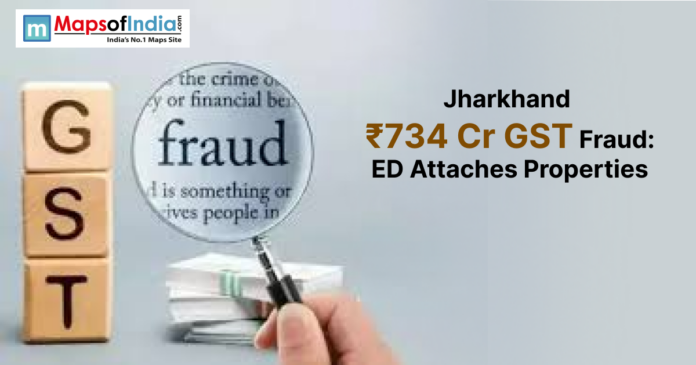The Enforcement Directorate has stepped up crackdowns on financial frauds to the tune of immovable properties valued at 15.41 crore in relation to a large-scale Goods and Services Tax scam that has been operating in several states. This is a part of an inquiry into a 734 crore fake Input Tax Credit scam that is among the largest of its kind to be uncovered in Jharkhand.
The investigation has found that the scam was organized with the help of 135 shell companies that only existed on paper. Such companies were floated to raise bogus invoices without even supplying goods or services. Through these invoices, fraudulent input tax credits were developed and transmitted to the other companies, enabling them to illegally lower their GST payment. It is estimated by the officials that counterfeit ITC with the value of 734 crore was sold via this network, leading to a huge loss to the exchequer.
Investigations have shown that the brains of the racket made commissions of almost ₹67 crore by selling these fake credits to the companies as the end-users. The properties confiscated by the Enforcement Directorate are residential and commercial premises purportedly obtained with the help of the money obtained in the framework of this fraud. The current attachment is not the first one in the case, as over 5 crore worth of properties had already been attached to date, bringing the aggregate value of the attached properties to above 20 crore.
The crackdown was initiated when the intelligence agencies detected suspicious transactions in Jharkhand, which was subsequently extended to detect linkages in West Bengal and Delhi. Several major figures, such as businessmen managing the network of fake firms, were arrested during raids made earlier this year. Through these arrests, law enforcers state that they have discovered the inner circles of an organized financial crime syndicate that has been taking advantage of GST system loopholes over the years.
Criminal cases are currently being pursued under the Prevention of Money Laundering Act. A prosecution complaint has already been placed, and attached properties will not be unfrozen unless the court decides on what to do with them. Authorities feel that this will be essential in ensuring that the accused does not dispose of the illegally obtained assets even as the trial goes on.
The case is being regarded as a precedent in the battle against massive tax evasion. Enforcement agencies are sending a powerful signal of not abusing the GST framework by attacking both the assets and the individuals. As more arrests and property seizures may follow, further investigations are likely to disrupt the entire network of the ₹734 crore scam as the authorities continue to eliminate the whole network.










